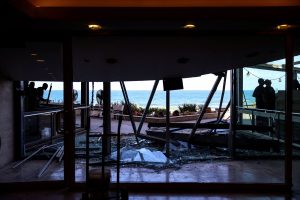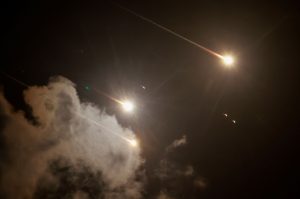As Israel weighs how to respond to Tehran’s latest missile barrage , it could take a page from its previous playbook when, after days of deliberation, its military targeted a single Iranian military site.
Few expect Israel’s response to be as narrow this time, posing a fresh test as the Biden administration seeks to avoid a new spiral of escalation.
“The U.S. already lacks sufficient diplomatic leverage to compel a cease-fire in Gaza and Lebanon,” said Jonathan Panikoff, a former U.S. intelligence officer now with the Atlantic Council, a Washington-based think tank.
Now that Iran has launched more than 180 ballistic missiles at Israel, which appears determined to carry out a robust response, “The challenge of avoiding a regional war is at its most difficult point since Oct. 7,” Panikoff added.
So far, the Biden administration has been trying to damp Israel’s ardor to strike back too forcefully by emphasizing that Iran’s missile attack was once again thwarted by Israeli and U.S. missile defenses
While acknowledging Iran’s missile barrage represented “a significant escalation,” national security adviser Jake Sullivan emphasized that it “appears to have been defeated and ineffective.”
The Biden administration has vowed that the U.S. will ensure that Iran faces “severe consequences” regardless of how Israel responds, a step U.S. officials have yet to spell out but which some analysts said could mean stepped-up sanctions enforcement.
Yet none of that appears likely to stay Israel’s hand—a point Prime Minister Benjamin Netanyahu underscored Tuesday when he declared that Iran had “made a big mistake” and “will pay for it.”
Unlike with Iran’s last missile attack, Israel doesn’t need to fear that a strike against Iran would spark a major clash with Hezbollah. Israel’s recent air and ground offensive against Hezbollah, and its outsize missile force, has greatly diminished its capabilities.
One contingency Israel needs to game out is Iran’s response. Tehran has said its Tuesday missile barrage was retaliation for the killing of Hassan Nasrallah , the Hezbollah leader, and has threatened “crushing attacks” if Israel strikes back.
After Iran’s missile and drone attack in April left Israel virtually unscathed, President Biden pressed Netanyahu to “take the win” and limit its retaliation. Israel appeared to listen and targeted the radar for an S-300 antimissile system near Isfahan that was protecting a nearby airfield and was thought by military analysts to be part of the defense for the Natanz nuclear facility.
Israel’s response isn’t expected to be as constrained this time, though some former officials expect it to show some restraint in taking military action against Iran.
An Israeli attack against Iran’s nuclear facilities or oil infrastructure, some analysts said, would greatly raise the stakes. Such an airstrike could provoke Tehran to launch a larger missile barrage, orchestrate terrorist attacks against Israeli interests abroad and step up its nuclear program, hastening Iran’s path to a bomb.
“Israel will seek to reinforce the idea that its technological superiority and military skill allow it to strike any target in Iran,” said Norman Roule, who served as the top U.S. intelligence officer on Iran from 2008 to 2017.
But Israel is likely to avoid striking targets that could spark a full-scale war with Iran, Roule said.
“A war with Iran would require the political, economic and military support, if not participation by the United States,” he added. “Israel no doubt recognizes that Washington has no interest in engaging in such a conflict. “
Iran, for its part, was looking for a way to lash out at its foe without igniting the full-fledged regional war it has sought to avoid for four decades.
The presence on Israel’s border of Hezbollah, a U.S.-designated terrorist organization, has widely been seen as Iran’s primary insurance policy against an Israeli attack at its nuclear facilities or its leadership in Tehran.
Now, with Hezbollah reeling from a devastating Israeli military campaign, Iran sought to find a way to show it was still serious about protecting its “axis of resistance” without inviting retaliation that could jeopardize its own security, analysts said.
“Iran’s leadership has increasingly been facing a lose-lose proposition: Watch its allies and interests severely weakened and do nothing, or retaliate, as it now has, and roll the dice on the consequences,” said Ali Vaez , director of the Iran Project at the International Crisis Group.
Having watched Israel pummel Hezbollah, Tehran might have opted for a “calculated provocation” rather than standing down, said Walter Posch, a senior researcher with the National Defense Academy in Vienna.
“In the end, decision makers in Tehran settled for the idea that restraint would not help to avoid a bigger confrontation anyway,” said Posch.
In planning its attack, Tehran has had to reckon with how deeply Israeli intelligence has penetrated Iranian security and that of some of its regional allies. That could explain why Iran’s barrage wasn’t accompanied by missile or drone attacks by the Houthis, Hamas, Hezbollah or Iraqi militias, which would have required advance coordination and potentially tipped off Israel’s spies.
Afshon Ostovar, an expert on Iran’s military at the Naval Postgraduate School in Monterey, Calif., questioned whether Iran’s attack served much of a purpose beyond the “faint hope” that it might deter Israel from attacking Iranian forces and its regional allies.
“This was revenge. Plain and simple,” he said. “Iran has played itself into a corner.”
Write to Michael R. Gordon at michael.gordon@wsj.com and Sune Engel Rasmussen at sune.rasmussen@wsj.com








